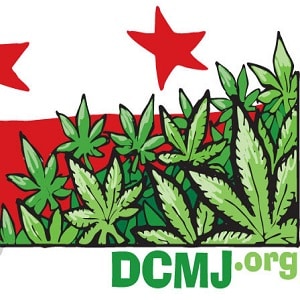 It’s been a wild week for marijuana legalization in D.C.. Earlier this week it appeared that marijuana legalization would be blocked in D.C. via the federal spending bill. Now it appears due to bad language in the bill, Initiative 71 will be allowed to be implemented, but that additional provisions for taxing and sales will not be allowed in the future. This seems to be the view of the Drug Policy Alliance and StopTheDrugWar.Org. Per the Drug Policy Alliance:
It’s been a wild week for marijuana legalization in D.C.. Earlier this week it appeared that marijuana legalization would be blocked in D.C. via the federal spending bill. Now it appears due to bad language in the bill, Initiative 71 will be allowed to be implemented, but that additional provisions for taxing and sales will not be allowed in the future. This seems to be the view of the Drug Policy Alliance and StopTheDrugWar.Org. Per the Drug Policy Alliance:
Republicans were successful in including language in the “cromnibus” federal spending bill that interferes with the right of Washington, D.C. to set its own marijuana policies. The language, however, was not what they originally wanted because they had to compromise with Democrats. The D.C. marijuana rider inserted in the bill allows D.C.’s marijuana decriminalization law (passed earlier this year) to stand, while prohibiting D.C. from taxing and regulating marijuana like alcohol (a D.C. Council committee recently approved tax-and-regulate legislation and it is widely believed that the Council will legalize, tax, and regulate marijuana next year if it can).
Because the language was poorly drafted there has been disagreement over whether or not the spending bill rider would overturn Initiative 71, an initiative approved by 70% of D.C. voters in November that legalizes marijuana possession and home cultivation for personal use. Based on statements by members of Congress, including members who were part of the funding bill negotiations, it is clear that the legislative intent of the rider was to allow both decrim and Initiative 71 to stand, while blocking D.C. from carrying out more sweeping reform in the future. Democratic Leader Nancy Pelosi; Rep. Eleanor Holmes Horton, who represents D.C.; Rep. Jose Serrano (D-NY), the ranking member on the House appropriations subcommittee that funds D.C.; Rep. Nita Lowey (D-NY), the Ranking Democrat on the House Appropriations Committee; and others have said that the D.C. rider allows Initiative 71 to stand. The D.C. government is blocked from enacting any new marijuana law reforms but it is free to implement and carry out reforms that have already been enacted.
Bill Piper, director of national affairs for the Drug Policy Alliance, had this to say:
“Initiative 71 was enacted on November 4th when 70% of D.C. voters approved it. Voters wanted to reduce racial disparities in the criminal justice system and focus police resources on serious and violent crime. The will of the people should stand. While Initiative 71 won’t take effect until after the Council transmits it to Congress in January and it goes through an administrative 30-day review period, it has very clearly already been enacted by the voters.
People who were part of the negotiations over the federal spending bill and this amendment in particular say the language was modified several times to reach a compromise. The marijuana compromise that Republicans and Democrats reached is that D.C’s decriminalization law and Initiative 71 can move forward, but D.C. cannot enact further changes, such as taxing and regulating marijuana to eliminate the illicit market.
The Drug Policy Alliance strongly urges the Council to transmit Initiative 71 to Congress as soon as it convenes in January. The Council should also continue to find ways to reduce the harms being caused by the war on drugs and rebuild the communities that have been devastated by decades of punitive drug policies.
Finally, it is worth noting that House Republicans were only able to pass this D.C. rider by doing it behind closed doors, with no debate or transparency. When marijuana law reform is debated out in the open we win. The House voted five times this year to let states set their own marijuana policies. In fact, one of those amendments, the Rohrabacher-Farr amendment prohibiting the Justice Department from undermining state medical marijuana laws, made it into the final spending bill.
We have no doubt that we will be able to repeal the D.C. rider in the future, setting D.C. completely free to tax and regulate marijuana like other states have done. The D.C. rider may slow us down but it won’t stop us. In any case, Initiative 71 is able to move forward.”
Source: Drug Policy Alliance – make a donation
And from StopTheDrugWar.Org:
By Phillip Smith
Despite the language Republicans managed to include in the “cromnibus” federal spending bill interfering with the District of Columbia’s right to set its own marijuana policies, several leading Democrats say that the Initiative 71 marijuana possession and cultivation legalization initiative is still alive.
A close reading of the relevant language in the bill shows that while it would block the District council from enacting a pending bill to tax and regulate marijuana, it would not undo DC’s decriminalization law. The language around Initiative 71 is less clear, but Democrats involved with the negotiations say it is clear that the legislative intent of the rider in question was to allow both decriminalization and Initiative 71 to stand.
House Minority Leader Nancy Pelosi; Rep. Eleanor Holmes Horton, who represents DC.; Rep. Jose Serrano (D-NY), the ranking member on the House appropriations subcommittee that funds DC; Rep. Nita Lowey (D-NY), the ranking Democrat on the House Appropriations Committee; and others have said that the D.C. rider allows Initiative 71 to stand. The D.C. government is blocked from enacting any new marijuana law reforms but it is free to implement and carry out reforms that have already been enacted.
“Initiative 71 was enacted on November 4th when 70% of DC voters approved it, said Bill Piper, director of national affairs for the Drug Policy Alliance. “Voters wanted to reduce racial disparities in the criminal justice system and focus police resources on serious and violent crime. The will of the people should stand. While Initiative 71 won’t take effect until after the Council transmits it to Congress in January and it goes through an administrative 30-day review period, it has very clearly already been enacted by the voters.”
The Drug Policy Alliance is urging the DC city council to transmit Initiative 71 to Congress as soon as it convenes in January.
Article From StoptheDrugWar.org – Creative Commons Licensing – Donate


























